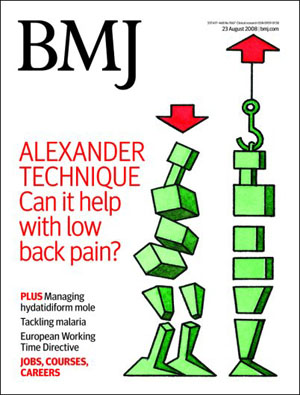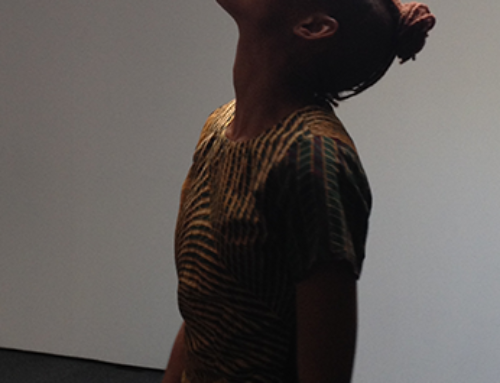
August 23rd, 2008 cover of BMJ
A recent study funded by the Medical Research Council and the NHS Research and Development fund finds long-term pain can be relieved through study of the Alexander Technique. The study published in the British Medical Journal, tested different back pain treatments using patients from 64 general practices in England. A total of 579 patients with chronic pain or recurrent low back pain participated; 144 were given “normal care,” 147 had massages, 144 took Alexander Technique lessons. Half of each group was also prescribed an aerobic exercise plan, primarily walking.
The team of researchers, from the University of Southhampton and the University of Bristol, evaluated participants before and after treatments by two primary measurers. First, researchers measured disability, based on questions about activities limited by pain. Secondly, researchers asked about the number of days in pain in the past four weeks. After a year of treatment, patients receiving Alexander lessons reported experiencing just three days of pain, compared to 21 days for those given normal care by their doctor. The patients who saw the biggest improvement were the ones who took the Alexander Technique lessons and also were prescribed an exercise plan. The improvements still held after one year, while massage’s benefits waned after three months.
Leaders in the field of mind/body medicine and behavioral sciences throughout this century have supported Alexander’s innovative research. Clinical studies have shown that the Technique improves breathing capacity and posture, modifies stress responses and is, for those who suffer from chronic pain, the preferred method for long-term relief.
BRITISH MEDICAL JOURNAL STUDY:
http://www.bmj.com/cgi/content/full/337/aug19_2/a884
ARTICLES ABOUT STUDY:
http://news.bbc.co.uk/2/hi/health/7568948.stm
http://www.telegraph.co.uk/(…)reducing-back-pain.html
http://www.guardian.co.uk/(…)/health.healthandwellbeing
http://www.webmd.com/(…)back-pain?src=RSS_PUBLIC
http://news.yahoo.com/(…)/back_pain_dc
http://uk.reuters.com/(…)idUKLK32331020080820




